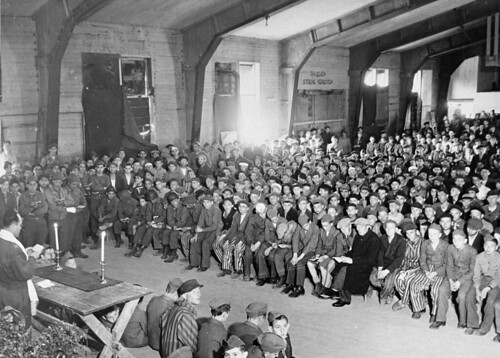
On May 18, 1945, American chaplain Rabbi Herschel Schacter conducts a religious service for Jewish survivors of the Buchenwald concentration camp shortly after liberation. (credit: National Archives and Records Administration)
To commemorate Yom HaShoah, we wanted to share with you a clip from our program with Elie Wiesel, “The Tragedy of the Believer.” The Nobel laureate is probably best known for his memoir Night, which tells the story of his experiences at the Auschwitz and Buchenwald concentration camps during the Holocaust.
During his conversation with Krista in 2003, Wiesel dispels the misconception that he forever lost his faith in God after the war. He also describes how language becomes holy through prayer. In the audio clip above (download mp3), he recites a prayer he wrote that ends his book, One Generation After:
I no longer ask you for either happiness or paradise; all I ask of You is to listen and let me be aware of Your listening.
I no longer ask You to resolve my questions, only to receive them and make them part of You.
I no longer ask You for either rest or wisdom, I only ask You not to close me to gratitude, be it of the most trivial kind, or to surprise and friendship. Love? Love is not Yours to give.
As for my enemies, I do not ask You to punish them or even to enlighten them; I only ask You not to lend them Your mask and Your powers. If You must relinquish one or the other, give them Your powers. But not Your countenance. Read the rest on: On Being Blog
No comments:
Post a Comment